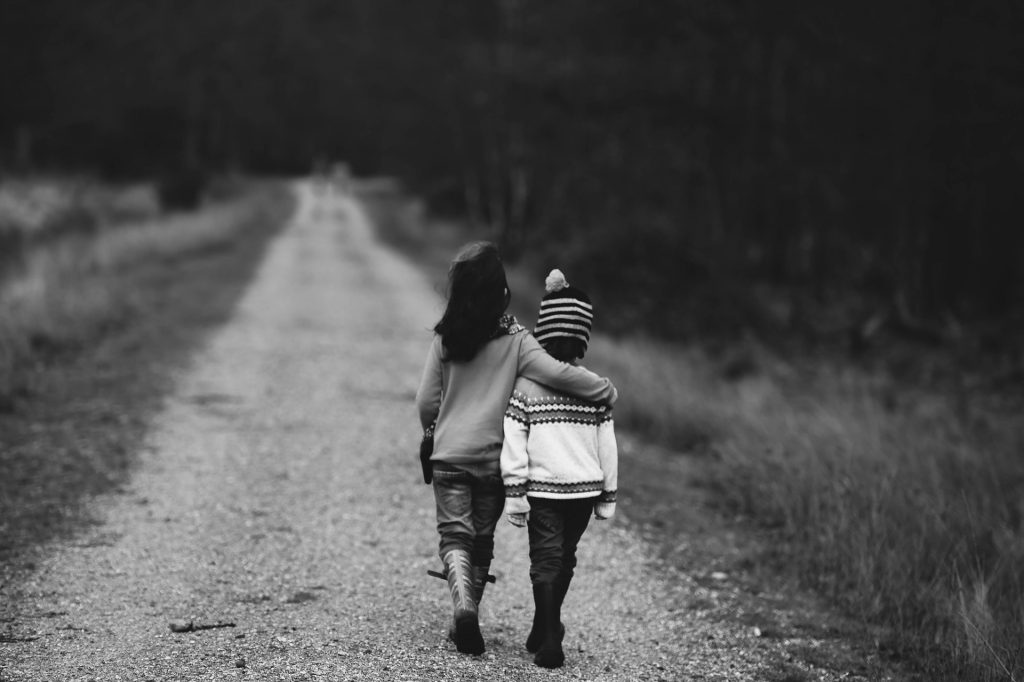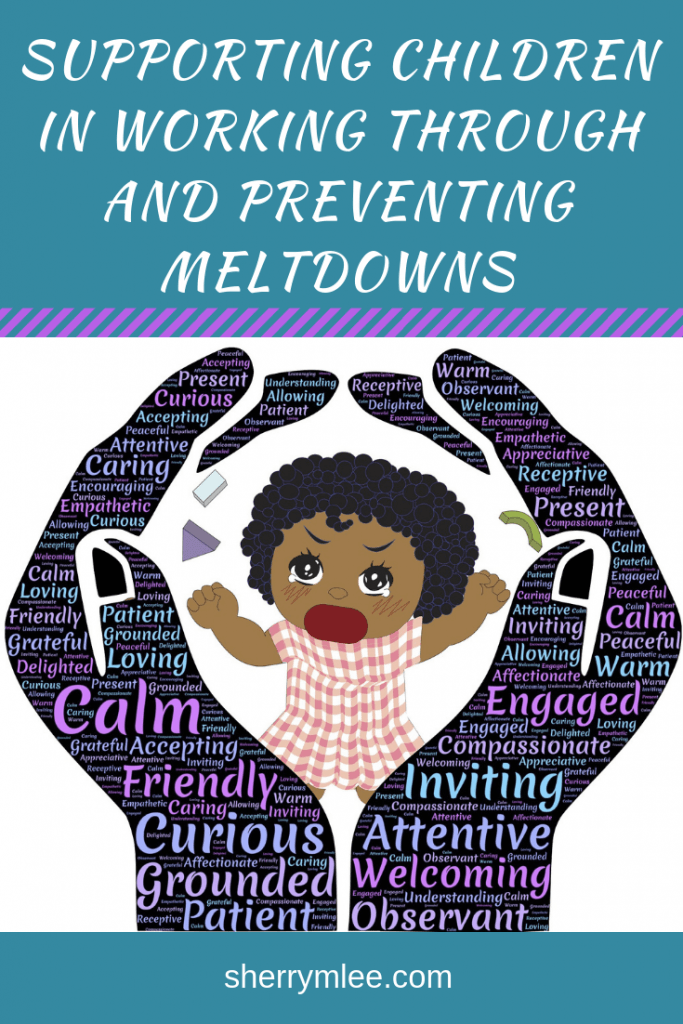I’m about to share something that I am not proud of. As an adult, I have had occasional meltdowns. Maybe you know the kind? I’ve yelled and screamed… even thrown the odd thing. Afterward, I pretty much always feel crappy and rarely, if ever, do I believe that my response was appropriate to whatever happened leading up to my angry response.

I don’t believe I’m alone. Meltdowns look different from person to person. Let’s consider for a moment a few of the responses that have become acceptable for an adult when feeling this way and/or what adults refer to as “having a bad day”:
- Locking ourselves in a room until we regain control of our emotions
- Swearing (depending on where we are and how loud it is)
- Yelling (again, depends on where we are and how loud we are)
- Grabbing a pillow and slamming it onto the bed
- Going for an adult beverage or pouring ourselves one at home
- Phoning a friend to vent
- Crying (yes, it is acceptable for adults to cry when life feels out of control)
- Going for a long walk or drive
*Downloads may contain affiliate links, helping me support my family at no extra cost to you. Thank you for your support!
Switching Thoughts to Our Children
I was a fairly explosive child. I hit my share of other children. Certainly I got into my share of screaming and yelling matches. I ran and hid from time to time. My childhood behavior is something I frequently reflect back on today. I now recognize some of the things that led to some of my meltdowns. Others I still cannot explain.
I believe every child has meltdowns at some point. For the sensory child or oppositional one, meltdowns happen even more frequently than for others. Regardless, all children will have meltdowns at least occasionally. We may not always know what leads up to them. It could be fear, anxiety, overwhelm, stress, frustration, over or under stimulation, etc.

What is acceptable for our children to do when in this state?
I’ve seen children walk away to be told that this isn’t an option… an adult is talking to them. How dare they walk away and not show respect. Yet depending on the situation, this may be one of the most appropriate things children can do. Listening to music, hugging a pillow and taking deep breaths may also help.
I’ve seen children swear, scream and yell to be told that this is not acceptable… often from the same adults that they themselves have witnessed screaming and yelling. On occasion, the adult is screaming and yelling while saying this is not acceptable behavior for the child to engage in.
I’ve seen children hit others and sometimes hit or injure themselves. Negative self-talk often happens. This is often dangerous.
Some children shout out bad names to others around them. This is not acceptable.
A few children throw objects, sometimes directly at the people around them. This also is not acceptable and can be dangerous.
Some children throw themselves down and simply cry.
What a Young Child Can’t Do
Even though the list below is ‘acceptable’ for an adult, it either isn’t appropriate or a possibility for a child to do.
- Have an adult beverage
- Go for a drive
- Go for a walk alone around the neighborhood to calm down (unless old enough to remain safe in doing so)
- Phone a friend to vent (Young children typically don’t have access to a phone nor a friend with a phone as an adult does.)
- Talk themselves through a difficult situation when in the moment (unless taught specific strategies to do this)

What can we do to help children having a meltdown?
Ensure Safety:
First of all, we need to ensure our children as well as others around them are safe. This also includes protecting the child’s dignity as much as possible.
As long as everyone is safe, the suggestions below can be implemented.
Give space:
Think about times when you are extremely upset. What would you prefer? Would you prefer for others to come kneel beside you and tell you to calm down? I know when I’m upset, if someone moves closer towards me to say, “You need to calm down!” I suddenly feel my blood boil even more. We are in rock brain mode in these moments. Our brains are not thinking flexibly. Neither is the child’s. For many children in the middle of a meltdown, getting closer to them and telling them to “calm down” will only result in further escalating the behavior… just as it would for many adults.
When the child is not having a meltdown, discuss safe places to go when upset. Then, when in the moment, allow the child to go there. This will be the child’s bedroom for many. Make sure the child knows of safe places within a school as well where he/she can go without bringing a world of attention with him/her.
Give Tools and Strategies:
It is very important to provide children with the tools to recognize oncoming meltdowns so they can become proactive in working through things before it gets to that point. I have included suggested resources to help with this in the Recommended Resources section below. When the child does start to use some of the tools and strategies, it is important to point this out and provide praise when appropriate. See the good here and acknowledge any improvements made.
Acknowledge feelings:
This is a big one for me. I still remember locking myself in a vehicle on one occasion as a child. I screamed out my feelings to be told that how I was feeling was ridiculous. Just as an adult has the right to feel a certain way, so too does a child. Simply telling the child how they are feeling is wrong does not stop the child from feeling the way he/she does. Instead, the child starts thinking there is something wrong with him/her to think that way, causing even more frustration.
Be consistent:
When working through meltdowns and when working with our children to develop strategies for recognizing when they are becoming elevated, it is important to be consistent. Sometimes this will mean that our children’s behavior will become worse before it gets better. This is especially true when our children are expecting a certain reaction that is no longer happening. We will be tested. Be consistent when trying something new.
Stay Calm:
This can be tough. Adults supervising children in full meltdown mode just want it to stop. However, two people being elevated is not better than one. Humor may work for some children to distract them from the meltdown. Others will need total space.
Allow a fresh start afterward:
If the adult is unable to move past the behavior and open the door for a fresh start, how can we expect the children to? I don’t believe anyone has a meltdown for the sake of having a meltdown. I also don’t believe a meltdown should ever result in someone being labelled as “bad.” View it as our children lagging in skills needed to handle whatever they are needing to handle in the moment. There may also be other factors such as fatigue, stress, etc. playing a role. Give children a fresh start and let them know they are valued. Point out when you see good things being done by these children as opposed to focusing on only pointing out when you see unexpected behavior. Most, if not all, children want to do well.

When to Approach a Child for Solutions to Meltdowns
The best time to figure out how to help a child is NOT when the child is in the middle of a meltdown. Rather, it is when the child is having a good day. Starting a discussion may help such as, “I notice _______ is hard for you. Tell me about this.” You may find out what is difficult about it and, from there, have the child come up with solutions that will work for him/her for preventing meltdowns in the future.
I think of my one daughter here who freaked out every time it was her turn to load the dishwasher. As much as she loves getting dirty outside, the ‘slime’ of the dishes is disgusting to her. The solution? She now wears gloves when putting dishes in the dishwasher. And guess what? No more meltdowns around putting dishes in the dishwasher (other than the odd groan about it being her turn again already!)
Recommended Resources
A few resources I strongly recommend are the following:
Raising Human Beings: Creating a Collaborative Partnership with Your Child by Dr. Ross Greene. I really don’t think a parent or educator can go wrong with anything written by Dr. Ross Greene. He doesn’t see children as being bad. He views children who have regular meltdowns as lagging in skills to self-regulate or do what would be expected. Dr. Greene provides practical tools and solutions for supporting our children in developing and strengthening those much-needed skills. I believe his books are a must-read for any parent with a child struggling to self-regulate.
The Explosive Child: A New Approach for Understanding and Parenting Easily Frustrated, Chronically Inflexible Children by Dr. Ross Greene is another great resource.
Zones of Regulation by Leah Kuypers goes through how to teach children to recognize and communicate the “zone” they are in. Tools for helping children self-regulate are provided.
What Should Danny Do? by Ganit and Adir Levy is an interactive storybook for children where they get to make choices for Danny and see how his choices affect his day. Children begin to see that there are natural consequences for choices they make throughout the day.
Superflex Takes on Glassman and the Team of Unthinkables by Stephanie Madrigal and Michelle Garcia Winner. Every child loves being a superhero. This comic book helps children recognize the size of problems. Children also develop strategies to work through their own behaviors and problems as they help the Unthinkables work through theirs.
Thinkables and Unthinkables Double Deck is a great resource to complement the Superflex book above. These are card decks with Unthinkables characters on them. These cards can be used as tools to remind our children to use their strategies. They can be used in a number of ways, depending on what will work best for your child.
A Sensory Tools Kit filled with sensory items will sometimes help a child stay or become regulated. If you are looking for more sensory ideas specifically, be sure to check out these 13 must-have quality items for your sensory space.
In Summary
A child often won’t automatically have a socially acceptable response when having a meltdown, but they do need to be allowed to have a response. It is our responsibility as the adults to help children learn how to release their anger in a socially acceptable manner that keeps them and everyone around them safe. Children still need to realize that they are being held accountable for their behavior regardless of circumstances. Being angry does not absolve them of their actions.
It is important that the adults supporting our children help them to recognize when they are having meltdowns and to provide them with support and strategies to make better, safe choices when in the moment.
No resource will be a complete magic wand that results in meltdowns suddenly disappearing forever. Just as us adults still have the occasional meltdown, so will our children. Ideally meltdowns will be reduced not only in number but also in the total time they take until the child is able to self-regulate.
Lastly, no one is perfect. We are all just parents, adults and children doing the best we can in the moment. Mistakes will be made some days. We will be brilliant and spot on other days. After all, we are human.

How About You?
What are some strategies that worked for you as a child to work through meltdowns? What are some strategies you use with children? Are there any strategies you wish you had learned sooner that work for you today as an adult? Please share in the comments below.













28 Comments
I definitely feel like having a complete meltdown once in a while, life can be stressful sometimes and we need to let go of all the stress our bodies have been holding on to one way or another. Thank you for this post! I think it gives us adults permission to feel our emotions and learn to release them properly.
Liliana
Thanks so much for reading it, Liliana! 🙂
I tell my children that they can scream in a pillow, or take deep breaths. My oldest has autism and we have had to talk about ways that he can avoid a meltdown, and what he can do if he can’t calm down. He can listen to music, pet his dog, or go for a walk. I also do yoga with my children when they are calm hoping that they will learn calming down techniques.
Those are all great strategies! Thank you for sharing! 🙂
Thank you, I haven’t heard of these books. I’m going to check them out.
I love them, but would also love to know what you think of them as well. 🙂
Great article! I agree we do need to take a deep breath and take a step back when we are feeling overwhelmed. And letting our children know how to deal with frustrations from a young age would definitely help them as they grow up with better control of their emotions. Thank you for sharing!
– Rapinder http://www.onelifethislife.com
Thank you so much for reading it, Rapinder! I appreciate your feedback. 🙂
I LOVE, LOVE, LOVE this! My daughter is 20 months and we suspect, may have some sensory sensitivity, although nothing serious. Her meltdowns have become more frequent, which can be stressful on everyone. My husband often mistakes them for tantrums, which I believe are very different things that can sometimes intersect. My husband and I are constantly reminding ourselves that people often expect way too much out of children, and that they’re human too. You provided some great tips. Thanks!
Thank you for reading the post! Yes, there seems to be a lot of expectations on both children and parents today for sure. I sincerely hope you are able to find what works best for you and your daughter.
Thanks for sharing these strategies and helpful resources.
Thank you for taking the time to read about them! 🙂
I really love how you mention how important it is to protect a child’s dignity! This is an area I know from experience can be challenging, but see being forgotten so many times, especially in public! Great post!
Thanks so much for reading it! 🙂
Thank you. My 3year old is currently going through a phase where if she is too tired or overstimulated she will have a big meltdown at the drop of a hat. Great post and I will check out the books too.
I believe they are resources every parent will find to be helpful! 🙂
It can be very difficult, and i’m definitely working on my patience when it comes to the meltdowns of my two stepkids. They’re extremely sensitive kids, and they cry over things so easily. I’m working hard on being less of a “suck it up” type person (how I was raised) because I feel like expressing your feelings and feeling safe to do so are so important.
I agree on all accounts… it is often difficult to remain patient and calm ‘in the moment’ and that it is important to provide an outlet for children to express their feelings. I wish you and your family all the best!
I love all of these. As adults we forget sometimes that we have children who are mini versions of us. I always see my daughter as a concentrated version of myself who hasn’t learned to be watered down for the world.
I can definitely relate to what you are saying! 🙂
Wow, this post is nice, my younger sister is analyzing these things, therefore I am going to convey them to
her.
Thank you! I hope she finds this to be helpful! 🙂
Its so sad that many parents don’t allow their children the space to have meltdowns. If we as adults can get to a point where we feel at our wits end, kids can too. I allow my children to go to their rooms and cry, yell, hit pillows, whatever they need to do to get out their frustration and then they can rejoin the family when they feel better. I also allow my children to tell me how they feel in a respectful way and I acknowledge their feelings as valid.
Providing space and acknowledgement of feelings is so important. Thank you for sharing your strategies! 🙂
Thank you so much for your blog. It is fantastic and a great resource. You are a voice for those who are unable to get through to the educators.
Thank you, Heather! I appreciate your supportive words. 🙂